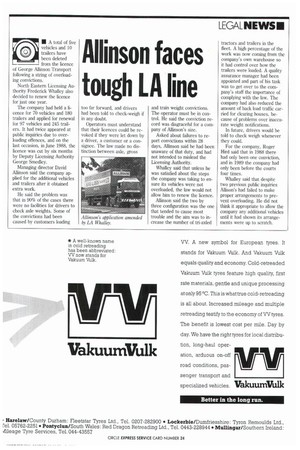Allinson faces tough LA line
Page 19

If you've noticed an error in this article please click here to report it so we can fix it.
• A total of five vehicles and 10 trailers have been deleted from the licence of George Allinson Transport following a string of overloading convictions.
North Eastern Licensing Authority Frederick Whalley also decided to renew the licence for just one year.
The company had held a licence for 70 vehicles and 180 trailers and applied for renewal for 97 vehicles and 245 trailers. It had twice appeared at public inquiries due to overloading offences, and on the last occasion, in June 1988, the licence was cut by six months by Deputy Licensing Authority George Smedley.
Managing director David Allinson said the company applied for the additional vehicles and trailers after it obtained extra work.
He said the problem was that in 90% of the cases there were no facilities for drivers to check axle weights. Some of the convictions had been caused by customers loading too far forward, and drivers had been told to check-weigh if in any doubt.
Operators must understand that their licences could be revoked if they were let down by a driver, a customer or a consignee. The law made no distinction between axle, gross and train weight convictions. The operator must be in control. He said the conviction record was disgraceful for a company of Allinson's size.
Asked about failures to report convictions within 28 days, Allinson said he had been unaware of that duty, and had not intended to mislead the Licensing Authority.
Whalley said that unless he was satisfied about the steps the company was taking to ensure its vehicles were not overloaded, the law would not allow him to renew the licence.
Allinson said the two by three configuration was the one that tended to cause most trouble and the aim was to increase the number of tri-axled tractors and trailers in the fleet. A high percentage of the work was now coming from the company's own warehouse so it had control over how the trailers were loaded. A quality assurance manager had been appointed and part of his task was to get over to the company's staff the importance of complying with the law. The company had also reduced the amount of back load traffic carried for clearing houses, because of problems over inaccurate weight notifications.
In future, drivers would be told to check weigh whenever they could.
For the company, Roger Hird said that in 1988 there had only been one conviction, and in 1989 the company had only been before the courts four times.
Whalley said that despite two previous public inquiries Allison's had failed to make proper arrangements to prevent overloading. He did not think it appropriate to allow the company any additional vehicles until it had shown its arrangements were up to scratch.








































































































